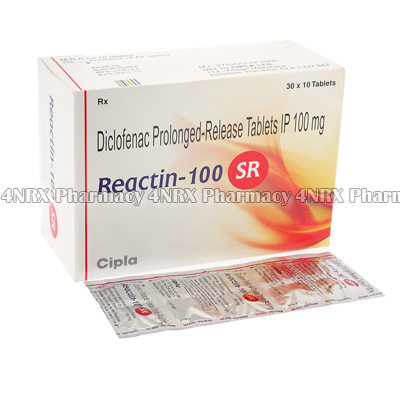 |
Home  Pain Pain  Reactin SR (Diclofenac Sodium) Reactin SR (Diclofenac Sodium) |
|
|||||||||
|
|
Reactin SR (Diclofenac Sodium)
What is Reactin SR (Diclofenac Sodium) used for? Reactin SR (Diclofenac Sodium) is a non-steroidal anti-inflammatory drug (NSAID) used to treat patients suffering from osteoarthritis, rheumatoid arthritis, or ankylosing spondylitis. The medication prevents the actions of certain chemicals released in response to injury that cause swelling, irritation, or pain. This also makes it useful for treating acute gout, lower back pain, or pain caused by minor injuries such as sprains or strains. Your physician may prescribe it to treat other unlisted conditions, as well. How should I use Reactin SR (Diclofenac Sodium)? Reactin SR (Diclofenac Sodium) is normally taken once daily at a dosage of one tablet, but your physician will determine the best treatment after observing your health condition and the severity of your symptoms. These should be swallowed with a large glass of water to aid absorption and a meal to prevent nausea. It is not suggested to lie down within ten minutes of administration to prevent dizziness or faintness. Never change the form of the tablets prior to use to avoid unintentionally destroying or altering the effects of their contents. Ask your pharmacist or physician any questions you have about using the medication to ensure the correct application. What are the side effects of Reactin SR (Diclofenac Sodium)? The use of Reactin SR (Diclofenac Sodium) may cause side effects in some patients such as:
Tell your physician about any symptoms that become worrying to you or if more serious side effects appear including sensitive skin, stiff muscles, faintness, trouble breathing, severe skin reactions, coughing up a substance resembling coffee grounds, darkened urine, discolored stools, or jaundice. These conditions may require emergency medical attention or alterations to your regimen to prevent more problems from occurring. Please Note Do not use Reactin SR (Diclofenac Sodium) if you are in the third trimester of pregnancy or if you have severe heart failure, an active ulcer, recurring intestinal disorders, severe liver failure, severe kidney failure, or if you have had a bad reaction to aspirin or other NSAID medications in the past. It is also important to tell your physician if you are a smoker or if you have hypertension, high cholesterol, heart failure, inflammatory bowel disease, a history of intestinal disorders, cerebrovascular disease, poor circulation, heart disease, clotting disorders, history of allergies, or systemic lupus as these conditions may cause complications requiring reduced dosages or other changes to your treatment. Strictly follow all instructions provided to you by your physician or pharmacist while using Reactin SR (Diclofenac Sodium). Optimum and safe dosage can differ based on the patient and the condition being treated. As this medication may be unsafe for certain patients, it is essential you always inform your physician if you are pregnant or breastfeeding, as well as if you have any allergies, other illnesses, or ongoing health conditions, and if you are taking any other form of medication, supplements, or herbal products. Immediately seek emergency medical care if you have an allergic or hypersensitive reaction. Common signs of a reaction include hives, swelling, skin rashes, chest pains, as well as trouble breathing or swallowing. 
|
||||||||||||||||||||||